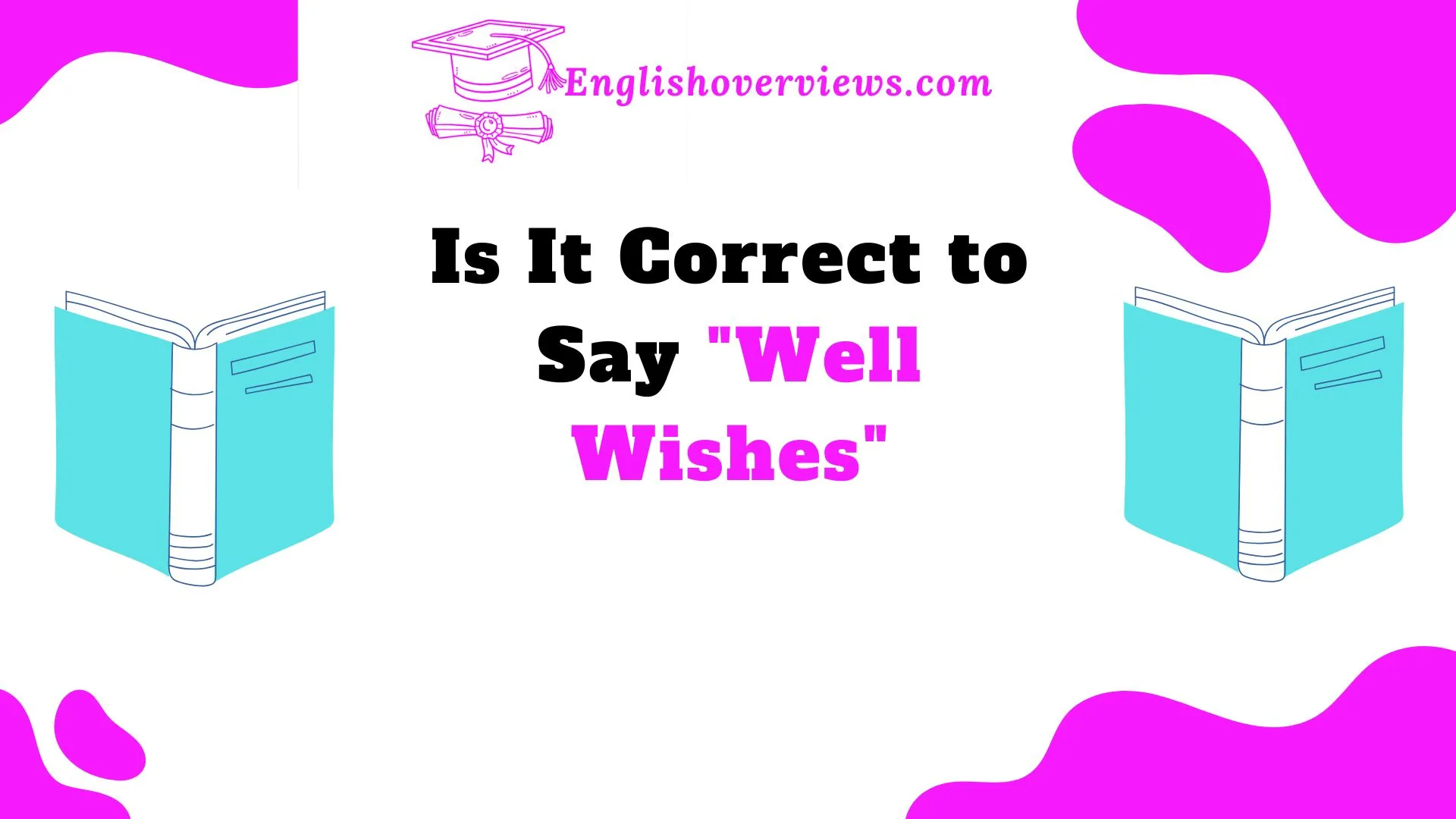We’ve all heard it. Whether someone’s starting a new job, recovering from an illness, or celebrating a birthday, we often say, “Well wishes!” But have you ever stopped to wonder if “well wishes” is actually the correct term to use? Does it make sense grammatically? Where did the phrase come from?
Is it more appropriate to say “good wishes” or “best wishes”? In this post, we’ll dive deep into the meaning, history, and proper usage of “well wishes” to uncover everything you need to know about this common phrase. So, tune in and let’s explore why “well wishes” has such a prominent place in our vocabulary.
Understanding the Phrase “Well Wishes”
The term “well wishes” is commonly used to express hopes or desires for someone’s success, health, or happiness. It’s typically used in contexts like:
- Wishing someone well on their birthday or new job.
- Offering encouragement during difficult times like illness or loss.
- Celebrating special occasions like weddings, graduations, or personal milestones.
In essence, “well wishes” are expressions of good intentions, hoping that life will treat someone kindly. But why exactly do we use “well” in this phrase? Let’s explore that further.
The History and Etymology of “Well Wishes”
The phrase “well wishes” may seem straightforward, but its etymology reveals interesting insights about the evolution of language. The word “wish” originates from the Old English wiscian, meaning “to wish for or desire.”
Over time, it expanded to encompass not just personal desires but also expressions of goodwill towards others.
The word “well” in this context is an adverb, modifying the verb “wish.” Historically, the adverb “well” has been used in English to indicate something positive or favorable.
For example, in phrases like “do well” or “live well,” the word emphasizes positive outcomes. When paired with “wishes,” it’s meant to convey a desire for the recipient’s good fortune or health.
In this sense, “well wishes” is a combination of a desire (the wish) and an expression of positive intention (the “well”).
Origins in English Literature
English literature often provides clues about the origin of phrases, and “well wishes” is no exception. Early examples of phrases similar to “well wishes” can be found in Shakespearean plays and medieval literature where characters would often express hopes for someone’s future, such as “May you live well” or “I wish you well.”
The use of well-wishing became more formalized during the 19th century, when written greetings like birthday cards and greeting cards became popular.
These cards were often filled with messages of hope, such as “Sending you my well wishes,” which reflected the era’s values of politeness and good manners.
Comparing “Well Wishes” with “Good Wishes” and “Best Wishes”
You’ve probably heard variations of well wishes, such as “good wishes” and “best wishes”. So, what’s the difference? Let’s break it down:
| Phrase | Meaning | Best Used When |
| Well Wishes | General expression of goodwill. | During birthdays, celebrations, or life transitions. |
| Good Wishes | A slightly more neutral, polite form. | In casual or formal settings when wishing someone success. |
| Best Wishes | Stronger expression of desire for success or happiness. | For significant milestones or when sending extra good intentions. |
While “well wishes” is appropriate for most occasions, “good wishes” is a little less personal, making it ideal for casual settings, and “best wishes” is the strongest, often used for close friends or more important events.
The Adverbial Use of “Well” in Historical Contexts
The use of “well” as an adverb isn’t newit has been part of the English language for centuries. In older texts, you’ll find expressions like “I wish you well” or “may you fare well.” These examples reflect a time when language was more formal and people placed greater emphasis on articulating wishes for others’ success.
Interestingly, this adverbial usage of “well” is seen in other phrases like “live well” or “do well,” which are also used to wish someone success or happiness.
In fact, the structure “wish you well” predates the more modern “well wishes,” which makes it grammatically acceptable, especially when used in formal and informal contexts.
The Appropriate Use of “Well Wishes” in Modern Language
While the phrase “well wishes” remains common in English today, it’s important to know when and how to use it correctly. Here are a few tips:
- Use “well wishes” in greetings or farewells (e.g., “Sending you my well wishes on your new job”).
- Avoid overusing it in professional or formal contexts. Sometimes, more specific phrases like “I hope you succeed” or “Best of luck” work better.
- If you are wishing someone health or a quick recovery, “well wishes” is a great choice, as it implies a deeper sense of caring.
In modern language, “well wishes” is versatile, but it should always reflect your intentions and relationship with the person you are addressing.
“Well Wishes” in Social Contexts: When to Use the Phrase
“Well wishes” are appropriate in a variety of social contexts. Let’s look at the most common occasions:
- Celebrations: Whether it’s a birthday, graduation, or wedding, “well wishes” conveys your happiness for someone’s milestone.
- Recovering from Illness or Injury: Offering well wishes during a difficult time, like an illness or surgery, can provide comfort and support.
- Life Changes: Moving to a new city, starting a new job, or entering a new relationship all warrant well wishes as you express your hopes for their success.
It’s important to note that while the phrase fits these situations, it can sometimes feel too general for close friends. In those cases, you may want to make your message more personal.
Thanking Someone for Their “Well Wishes”
When someone offers their well wishes, responding appropriately is key. You can thank them in a way that feels genuine and acknowledges their kindness. Here are a few examples:
- “Thank you for your well wishes it means a lot to me!”
- “I really appreciate your kind words and well wishes.”
- “Your well wishes have made my day, thank you!”
Expressing gratitude helps to strengthen social bonds and shows that you truly appreciate the gesture.
Giving “Well Wishes” to Others
Giving well wishes can be more than just a polite formality; it’s an opportunity to show you care. Here’s how to make your well wishes feel more personal:
- Be Specific: Instead of just saying “well wishes,” add something like, “I hope you do well in your new role.” This makes your message more personal and thoughtful.
- Tie It to the Occasion: If someone is recovering from illness, say, “Wishing you a speedy recovery.” If they’re celebrating a promotion, say, “Wishing you continued success in your new role!”
Alternatives to Saying “Well Wishes”
Sometimes, “well wishes” might feel a bit too generic or formal for certain situations. In those cases, here are a few alternatives:
- Good luck – Perfect for starting new projects or ventures.
- Best of luck – A stronger form, often used in more significant situations.
- Take care – A softer, more informal way of wishing someone well.
- All the best – A universal phrase, suitable for many occasions.
The key is to choose the phrase that fits the relationship and situation.
“Well Wishes” Versus “Good Wishes” – Public Opinion and Usage Trends
While “well wishes” is widely used, people sometimes prefer alternatives depending on the situation. A study from the Oxford English Dictionary showed that “best wishes” has seen a rise in popularity, especially in social media greetings, where brevity is key.
Interestingly, good wishes tends to be more commonly used in formal settings, while well wishes is seen as more conversational.
How Digital Communication Has Influenced the Use of “Well Wishes”
With the rise of digital communication, the way we offer well wishes has changed. Today, well wishes are more likely to be delivered via text, email, or social media than through greeting cards. Here’s how digital communication is affecting the phrase:
- Social media platforms allow people to send quick, informal well wishes to a wide audience.
- Text messages often shorten well wishes into something like “Good luck!” or “Best wishes!” to save time.
- The rise of emojis and GIFs also adds a layer of personalization that written words might lack.
Despite these changes, the intent remains the same: conveying good intentions and support.
The Shift from Cards to Electronic Messages
In the past, people would send physical greeting cards to express their well wishes. Today, e-cards and social media posts have taken over, providing a quicker and more accessible way to share your sentiments. However, some people still appreciate receiving handwritten messages or printed cards, as they carry a sense of personal touch.
Social Media and the Spread of “Well Wishes”
Social media has revolutionized the way we share well wishes. From posting on someone’s wall to sending private messages, platforms like Facebook, Instagram, and Twitter have made it easier than ever to convey your feelings.
The phrase “well wishes” has gained new meaning in online communities, where people can express hope for each other’s success and happiness in a shared public space.
Is “Well Wishes” Grammatically Correct? Insights from Language Experts
According to linguists, “well wishes” is grammatically correct. It follows the standard structure of adjective + noun (in this case, “well” as an adverb modifying “wishes”). Some may argue that “wish” is inherently an action verb, so the noun form “wishes” works perfectly well when paired with an adverb like “well.”
In fact, experts argue that the phrase is perfectly natural and widely accepted in modern English.
FAQs
Q1: Can I say “Well Wishes” for a new job?
Yes, “well wishes” is a common way to express your hopes for someone’s success in a new job.
Q2: Is “Good Wishes” better than “Well Wishes”?
It depends on the context. “Good wishes” tends to be more neutral, while “well wishes” conveys a stronger sense of care.
Q3: How do I respond to “Well Wishes”?
Thank the person warmly! For example, “Thank you for your well wishes, I truly appreciate them.”
Conclusion
In conclusion, “well wishes” is a grammatically correct and widely accepted phrase that expresses goodwill and positive intentions towards others. Whether you use it in social media posts, cards, or face-to-face greetings, it remains a meaningful way to show that you care.
So, next time someone offers their well wishes, embrace the sentiment and pass it on with your own.

Alyan Ashraf is the creative mind behind English Overviews, a platform dedicated to helping learners master the English language. Passionate about education and language development, Alyan specializes in simplifying complex English concepts, making learning accessible for students of all levels.











